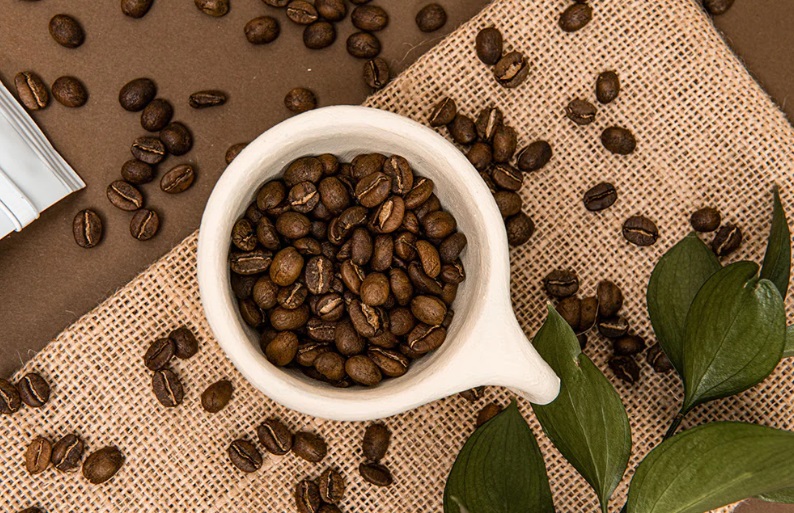
French roast coffee is known for its deep, dark roast level that pushes the beans just to the edge of being charred. This intense roasting process results in coffee beans that are very dark brown, almost black in color, with a shiny, oily surface. The beans are roasted until they reach what’s known as the “second crack,” a point where their cell walls break down, releasing oils to the surface. This gives French roast its signature glossy look and contributes to its robust flavor profile.
Key Takeaways
- Bold and Smoky Flavor: French roast coffee is celebrated for its bold, smoky flavor. This intense taste is less acidic compared to lighter roasts, making it a favorite among those who prefer a stronger, more pronounced coffee experience.
- Lower Caffeine Content: Despite its strong flavor, French roast coffee actually contains less caffeine than lighter roasts. The prolonged roasting process reduces the caffeine content, making it a suitable option for those looking to lower their caffeine intake without sacrificing the taste of their brew.
- Optimal Brewing Methods: To get the most out of French roast coffee, using a French press or a drip coffee maker is recommended. These methods allow the rich, smoky flavors to fully develop, offering a robust cup of coffee that showcases the distinct characteristics of French roast.
- Focus on Roast Over Bean Flavor: The flavor of French roast coffee is largely defined by the roasting process itself, rather than the underlying notes of the coffee beans. This roast tends to mask the original flavors of the beans, emphasizing the roast quality and depth instead.
Roasting Process of French Roast Coffee
French roast coffee is renowned for its intense, high-temperature roasting process that pushes the beans past what is known as the “second crack.” During roasting, the beans first crack, releasing moisture in the form of steam. As the temperature continues to rise, they reach the second crack, where their cell walls break down, and oils are pushed to the surface. This stage is crucial as it significantly darkens the beans and enhances their oily sheen, giving French roast its distinctive bold and smoky flavor profile.
The duration of the roast is not just about achieving a dark color; it also influences the coffee’s overall character and caffeine content. Longer roasting times lead to a decrease in caffeine levels because caffeine is broken down by prolonged exposure to high heat. Consequently, despite its robust flavor, French roast coffee generally contains less caffeine than lighter roasts, making it an intriguing choice for those who prefer less caffeine but still enjoy a hearty, flavorful cup of coffee.
Comparing French Roast to Other Roasts
French roast stands out in the world of coffee due to its darker, more intense roasting compared to most other roasts. It’s even darker than other dark roasts like Italian roast, which stops just before the beans become charred. French roast is roasted until the beans are very dark and oily, which imparts a smoky, almost burnt flavor that is distinctly different from the sweeter, more acidic profile of lighter roasts.
When comparing flavor profiles, French roast offers a less acidic but more pronounced smoky taste compared to lighter roasts, which tend to retain more of the original flavors of the coffee bean. In terms of brewing suitability, the bold and less acidic nature of French roast makes it particularly well-suited for methods that complement its strength and body, such as a drip coffee maker or a French press.
Health Benefits and Nutritional Information
French roast coffee, like other types of coffee, is loaded with beneficial antioxidants, which play a significant role in health maintenance by fighting free radicals in the body. These free radicals are known to cause oxidative stress, which can lead to chronic diseases. Regular consumption of French roast coffee can help in reducing the risk of such health issues due to its antioxidant properties.
Moreover, French roast coffee contains polyphenols and chlorogenic acids. These compounds are not only good antioxidants but also have other health benefits. Polyphenols can help manage blood pressure levels and improve blood vessel health, while chlorogenic acids have been found to aid in glucose metabolism. These components make French roast coffee a favorable choice not just for its flavor but also for its potential health benefits.
Best Brewing Practices for French Roast Coffee
To fully enjoy French roast coffee, selecting the right grind and water quality is crucial. The optimal grind for French roast varies depending on the brewing method: coarse grinds are ideal for French presses, medium grinds are best for drip coffee makers, and fine grinds suit espresso machines. This ensures that the coffee’s oils and flavors are properly extracted, enhancing the overall taste.
The quality of water used also affects the final cup of coffee. Using fresh, filtered water is recommended as it is free from impurities that could alter the taste of the coffee. Regarding the coffee-to-water ratio, a general guideline is to use about 1 to 2 tablespoons of ground coffee for every 6 ounces of water. This ratio can be adjusted depending on personal taste preference, whether you desire a stronger or milder brew.
FAQs
Is French Roast Coffee More Caffeinated?
Contrary to popular belief, French roast coffee actually has less caffeine compared to lighter roasts. The extended roasting process it undergoes breaks down more caffeine molecules, resulting in a lower caffeine content. This makes French roast an excellent choice for those who are sensitive to caffeine but still enjoy the robust flavor of coffee.
Can You Identify French Roast Coffee by Its Beans?
Yes, French roast coffee beans are distinctive. They are typically very dark, almost black in color, and have a shiny, oily surface due to the oils being released during the intense roasting process. These visual cues are a quick way to identify French roast coffee among other types of coffee beans.
Does the Type of Bean Affect the Quality of French Roast?
Indeed, the type of bean used does influence the quality of French roast coffee. While both Arabica and Robusta beans can be used, Arabica is generally preferred for its smoother and more complex flavor profile. However, the intense roasting required for French roast means that some of the subtle flavors of Arabica beans might be overshadowed by the smoky and bold characteristics of the roast itself.
Final Thoughts
French roast coffee is a standout choice for those who love a deep, smoky flavor in their coffee. Its bold profile and reduced acidity appeal to many, making it a popular option in the realm of dark roasts. The roasting process itself defines much of what French roast coffee is, overshadowing the inherent flavors of the beans but creating a consistent and robust taste.
For coffee enthusiasts looking to explore the nuances of dark roasted coffee, trying different French roast blends can be a delightful experience. Each blend offers its own unique take on the classic French roast flavor, allowing you to discover your personal favorite.









